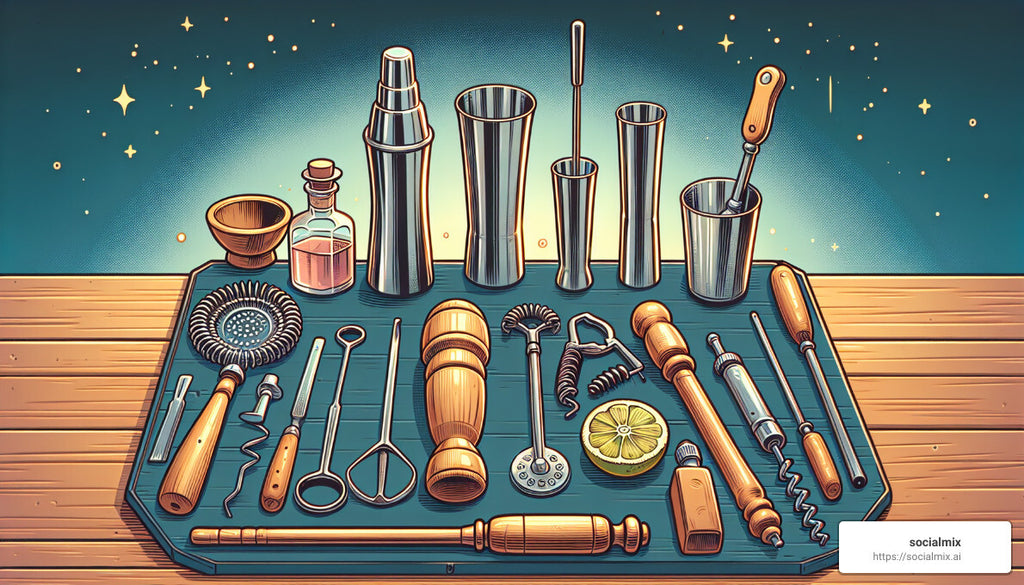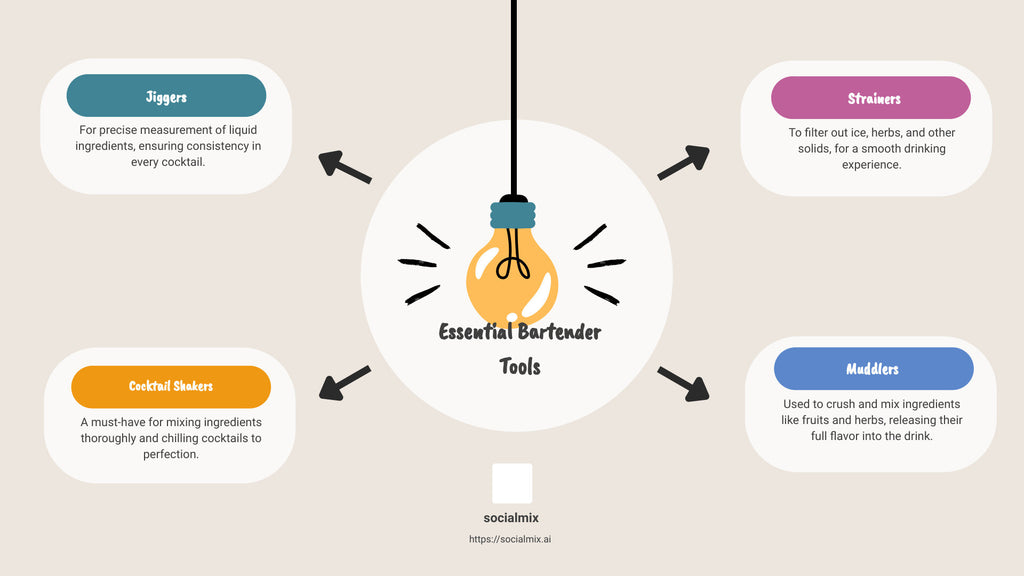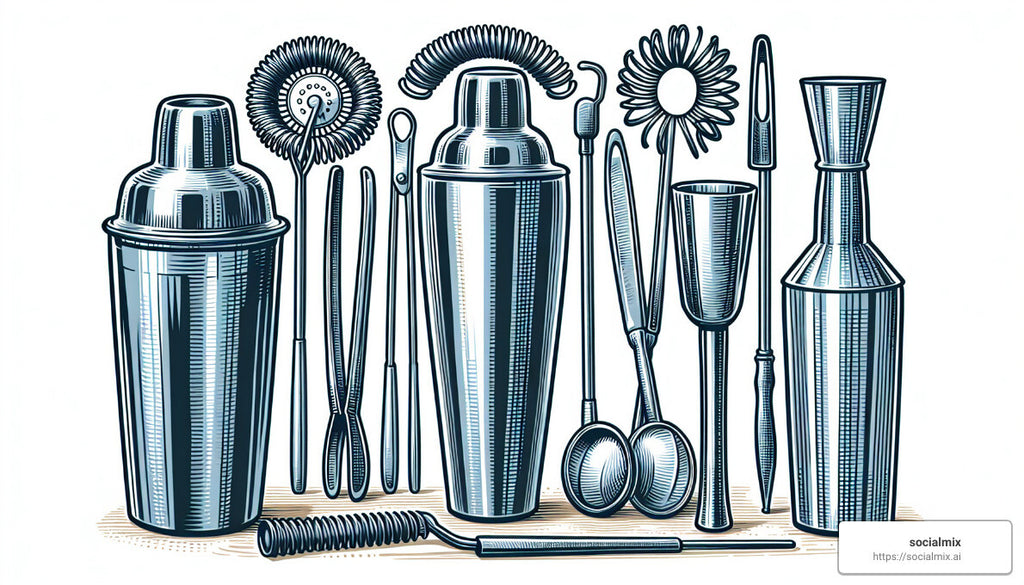Mixologist or Bartender: Which One Do You Need?

Mixologist vs Bartender: Crafting Your Perfect Night
When planning your next social gathering, you might wonder whether you need a mixologist or a bartender. Understanding the distinction between these two roles can lift your event in unique ways.
- Bartenders: Focus on quick service, customer interaction, and maintaining the bar.
- Mixologists: Specialize in crafting unique and complex cocktails, often incorporating creative techniques.
The rise of the craft cocktail movement and the increasing demand for unique drink experiences have revived the mixologist's role. While bartenders are essential for managing a busy bar and creating well-crafted drinks, mixologists bring an added layer of art and innovation.
In today’s social scene, both roles hold significant sway. The bartender ensures everyone’s glass is full and the bar remains orderly. Meanwhile, the mixologist turns each drink into a masterpiece, adding social cachet to any gathering. As Nico De Soto, a renowned mixologist, puts it, "A bartender tends the bar but a mixologist experiments with different flavours and techniques."
Choosing between a mixologist and a bartender depends on the experience you desire: quick service with a personal touch, or a memorable drink that sparks conversation.

Understanding the Roles
What is a Bartender?
A bartender is the backbone of any bar. They handle a wide variety of tasks that keep the establishment running smoothly. From serving alcoholic drinks to managing bar maintenance and delivering excellent customer service, bartenders are multitaskers.
Bartending Basics:
- Alcoholic Drinks: Bartenders are skilled in preparing and serving a range of drinks. They can mix a classic Margarita or pour a perfect pint of beer.
- Bar Maintenance: Keeping the bar clean and organized is crucial. Bartenders wash glassware, stock supplies, and ensure everything is in order.
- Customer Service: Engaging with customers is key. Bartenders listen to stories, share their own, and create a welcoming atmosphere.
Quick Fact: Bartenders don't need formal qualifications, but experience and a friendly demeanor go a long way. A great bartender can make or break your night out.
What is a Mixologist?
A mixologist is a craftsman of cocktails. They go beyond the basics of bartending to create exceptional drinks that are both visually stunning and delicious. Mixologists focus on the art and science of combining elixirs to lift the drinking experience.
Mixology Expertise:
- Combining Elixirs: Mixologists experiment with flavors, techniques, and ingredients to craft unique cocktails. They often use super-premium spirits and exotic ingredients.
- Exceptional Cocktails: Each drink is a masterpiece. Mixologists pay attention to every detail, from the aroma to the presentation.
- Cocktail Culture: Mixologists are deeply embedded in cocktail culture. They follow trends, such as the resurgence of absinthe, and often create signature drinks for upscale venues.
Quick Fact: The term "mixologist" dates back to the 1850s but fell out of favor during Prohibition. Today, it's back in vogue thanks to the craft cocktail movement and social media influence.

Nico De Soto, a renowned mixologist, says, "A bartender tends the bar but a mixologist experiments with different flavours and techniques." This quote highlights the key difference: bartenders focus on service, while mixologists focus on creating memorable drinks.
Choosing between a bartender and a mixologist depends on what you need. If you want quick service and a personal touch, a bartender is your go-to. If you're looking for unique, conversation-sparking cocktails, a mixologist is the way to go.
Key Differences Between Mixologists and Bartenders
Service Orientation
The primary distinction between mixologists and bartenders lies in their service approach. Bartenders are the face of the bar, providing quick and efficient service while engaging with customers. They are skilled at multitasking—taking orders, mixing drinks, and maintaining a friendly atmosphere. Mixologists, on the other hand, focus primarily on the drinks themselves. They are often behind the scenes, crafting unique cocktails that lift the drinking experience.
Nico De Soto, a renowned mixologist, captures this well: "A bartender tends the bar but a mixologist experiments with different flavours and techniques." This highlights the key difference: bartenders focus on service, while mixologists concentrate on creating memorable drinks.
Skill and Knowledge
Bartenders need to master the basics: knowing classic cocktail recipes, understanding different types of alcohol, and being able to serve drinks quickly and consistently. They also need excellent customer service skills to ensure patrons have a great time.
Mixologists take this a step further. They dig into the science of drink-making, understanding the molecular properties of ingredients. This allows them to experiment and create innovative cocktails. For example, they might use techniques like sous-vide infusions or molecular mixology to introduce new textures and flavors.
While bartenders might make a Margarita dozens of times in a night, a mixologist might spend hours perfecting a unique twist on that classic drink.
Work Environment
The work environments for bartenders and mixologists can also differ significantly.
Bartenders typically work in high-energy settings like bars, pubs, and restaurants. Their role is to keep the drinks flowing and the customers happy. They need to be quick, efficient, and personable.
Mixologists might work in more specialized environments. This could include high-end cocktail bars, speakeasies, or even corporate liquor companies. Some mixologists don't work behind the bar at all, instead focusing on developing new cocktail menus or consulting for various establishments.
For instance, venues like Raffles Doha have dedicated drink labs where mixologists can experiment with new techniques and ingredients. This allows them to push the boundaries of traditional cocktail-making, incorporating elements like foams, gels, and even culinary techniques like smoking.

In summary, while both roles are essential in the hospitality industry, they serve different purposes. Bartenders excel in customer interaction and quick service, whereas mixologists focus on the artistry and innovation of drink-making. Understanding these distinctions can help you decide which professional you need for your specific event or venue.
The Evolution of Mixology
Historical Background
The term mixologist has an intriguing history that dates back to the 1850s. During this time, people began experimenting with mixing spirits, sugar, water, and bitters to create the first cocktails. This period marked the birth of mixology as an art form, though it carried a hint of pretentiousness and was seen by some as an attempt to lift the humble barkeep.
By the 1890s, the title "mixologist" implied more than just mixing drinks—it suggested a pseudoscientific approach to crafting beverages. However, the Prohibition era (1920-1933) in the United States brought a temporary end to this craft. With spirits being illegal, the focus shifted to moonshine and other straight forms of alcohol, making the idea of a mixologist obsolete.
Fast forward nearly 100 years after Prohibition, mixology has seen a resurgence. The rise of super-premium spirits and the craft cocktail movement have brought the mixologist back into the spotlight. This revival is not just about making drinks; it's about creating an experience, much like it was in the 1850s.
Modern Mixology Trends
Today's mixologists are at the forefront of several exciting trends, driven by both historical influences and modern social dynamics.
Super-Premium Spirits and Craft Distilling The quality of ingredients has never been higher. The rise of super-premium spirits and craft distilling has given mixologists a broader palette of flavors and textures to work with. This shift has challenged the dominance of billion-dollar alcohol beverage conglomerates, giving rise to a more artisanal approach to cocktail making.
Social Media Influence Platforms like Instagram have played a significant role in the modern mixology trend. The visual appeal of a beautifully crafted cocktail can turn a mixologist into a social media celebrity. This has led to an emphasis on not just taste but also presentation, with elaborate garnishes and unique glassware becoming the norm.
Craft Cocktails and the Modern Hipster The craft cocktail movement has been bolstered by the rise of foodie culture and the modern hipster. These social trends have created a demand for unique, handcrafted drinks that tell a story. Mixologists are now seen as artists, each with their own style and flair.
Sustainability and Local Ingredients Sustainability has become a key focus in modern mixology. Mixologists are increasingly using seasonal and locally sourced ingredients to reduce waste and support local agriculture. This trend aligns with a broader societal push towards sustainability and environmental responsibility.
Innovative Techniques From molecular gastronomy to sous-vide infusions, modern mixologists are pushing the boundaries of what's possible in a glass. These techniques add new dimensions to the cocktail experience, making each drink a unique creation.
In conclusion, the evolution of mixology is a fascinating journey from its 1850s origins, through the challenges of Prohibition, to its modern resurgence fueled by social media, super-premium spirits, and innovative techniques. This blend of history and modern trends has cemented the role of the mixologist as both a scientist and an artist in beverages.
Next, we will explore when to hire a mixologist vs. a bartender, helping you make the right choice for your event or venue.
When to Hire a Mixologist vs. a Bartender
For Casual Events
If you're planning a casual event like a backyard barbecue, birthday party, or a casual corporate gathering, hiring a bartender is usually the best choice. Bartenders excel in quick service and customer interaction. They can effortlessly handle a busy bar, ensuring that guests are served promptly and efficiently.
Key Considerations:
- Event Type: Casual and relaxed gatherings.
- Customer Expectations: Quick service and friendly interaction.
- Budget Considerations: Generally more affordable than hiring a mixologist.
Bartenders are skilled at making classic cocktails and serving a variety of alcoholic drinks. They keep the atmosphere lively and engaging, often sharing stories and jokes with guests. Their primary focus is on service delivery, making sure everyone has a drink in hand and is having a good time.

For High-End Events
For upscale events like weddings, corporate galas, or high-profile parties, a mixologist can lift your event with unique and exceptional cocktails. Mixologists bring creativity and a deep understanding of flavors to the table, crafting drinks that are not only delicious but also visually stunning.
Key Considerations:
- Event Type: Formal and high-end gatherings.
- Customer Expectations: Unique cocktails and an liftd experience.
- Budget Considerations: Typically more expensive due to the specialized skills and premium ingredients involved.
Mixologists focus on the art and science of drink-making. They experiment with different ingredients, techniques, and presentations to create one-of-a-kind cocktails. If your event aims to impress and provide a memorable experience, a mixologist is the way to go.

In summary, the choice between a mixologist vs bartender largely depends on the nature of your event, what your guests expect, and your budget. For casual events, bartenders provide excellent service and keep the drinks flowing. For high-end events, mixologists offer a unique and liftd cocktail experience that can leave a lasting impression on your guests.
Frequently Asked Questions about Mixologists and Bartenders
Is there a difference between a bartender and a mixologist?
Yes, there is a difference. Bartenders are professionals who serve drinks and take care of bar maintenance. They focus on providing excellent customer service and ensuring guests have a great experience.
Mixologists, on the other hand, specialize in crafting unique and exceptional cocktails. They often experiment with ingredients, flavors, and presentations to create one-of-a-kind drinks.
Mac Gregory, Director of Food and Beverage for Starwood Hotels, notes, "a mixologist where a bartender leaves off mixology begins." This means that while bartenders ensure guests are happy, mixologists focus on the art and science of making drinks.
What makes you a mixologist?
To be a mixologist, you need to go beyond basic bartending skills. Mixologists have a deep understanding of the ingredients, flavors, and techniques used in cocktail creation. They often experiment with new recipes and push the boundaries of what cocktails can be.
According to the research, a mixologist is like a chef who not only creates but also innovates. They pay close attention to the quality and taste of every drink they make. If you're passionate about crafting exceptional cocktails and continuously improving your skills, you might be on your way to becoming a mixologist.
Can I call myself a mixologist?
Calling yourself a mixologist isn't just about the title; it's about the expertise and dedication you bring to the craft. As China Morbosa, Head Bartender at The Eveleigh, puts it, "Never trust someone who considers themselves a mixologist" if they’re more concerned with their status than the guest's happiness.
To confidently call yourself a mixologist, you should have a solid foundation in bartending and a proven ability to create innovative cocktails. It's about the skills and passion you bring to your work, not just the label.
In the end, whether you identify as a bartender or a mixologist, your focus should always be on delivering the best possible experience for your guests.
Conclusion
At socialmix, we believe in the power of both bartenders and mixologists to create unforgettable experiences. Whether you need a bartender to keep the conversation flowing and the bar tidy, or a mixologist to craft extraordinary cocktails, understanding their roles helps you make the right choice for your event.
Bridging Cocktail Culture and Bartending Expertise
Our mission is to bridge the gap between cocktail culture and bartending expertise. We celebrate the artistry of mixologists who push the boundaries of flavors and presentation. At the same time, we honor the essential role of bartenders in providing excellent service and creating a welcoming atmosphere.
Enhancing Social Gatherings
Every social gathering is an opportunity to connect, laugh, and create memories. By choosing the right professional for your event, you can lift the experience for your guests. Whether it's a casual get-together or a high-end soirée, the right drinks and service can make all the difference.
Explore more about our services and how we can help you create the perfect cocktail experience at socialmix.
Cheers to unforgettable moments and exceptional cocktails!




Leave a comment